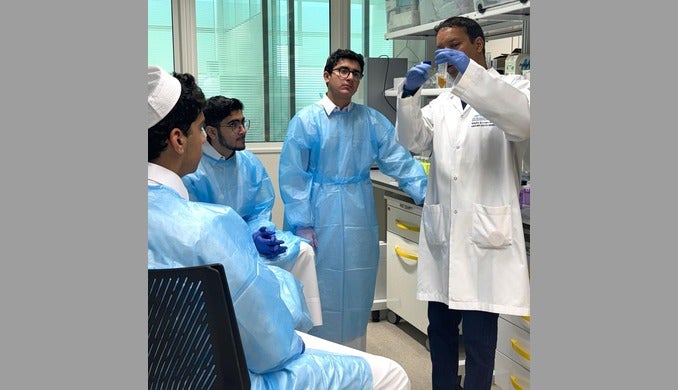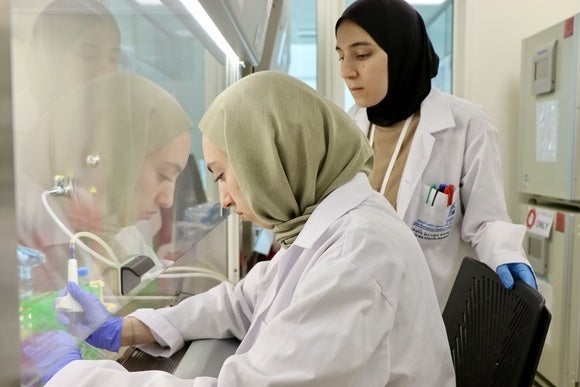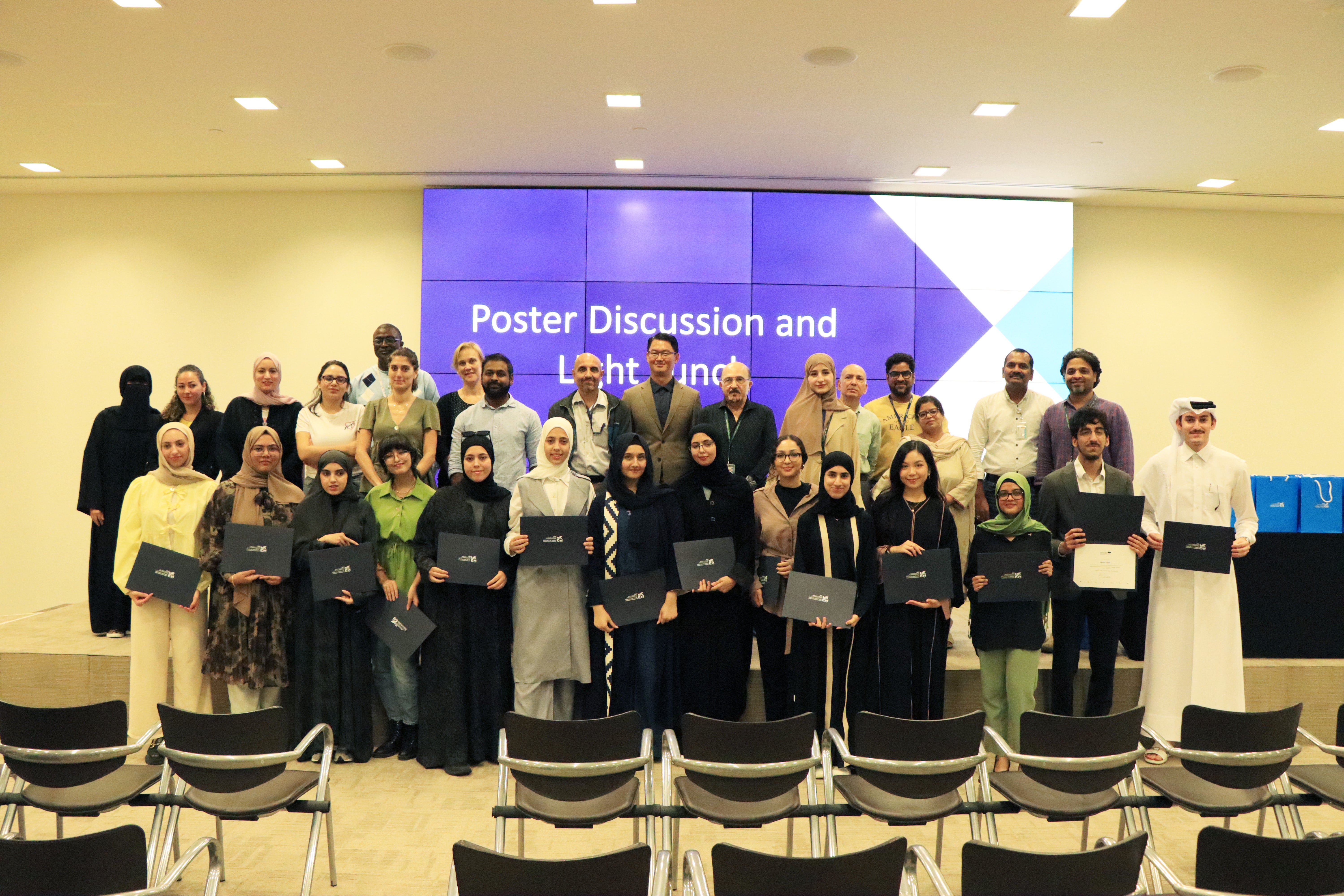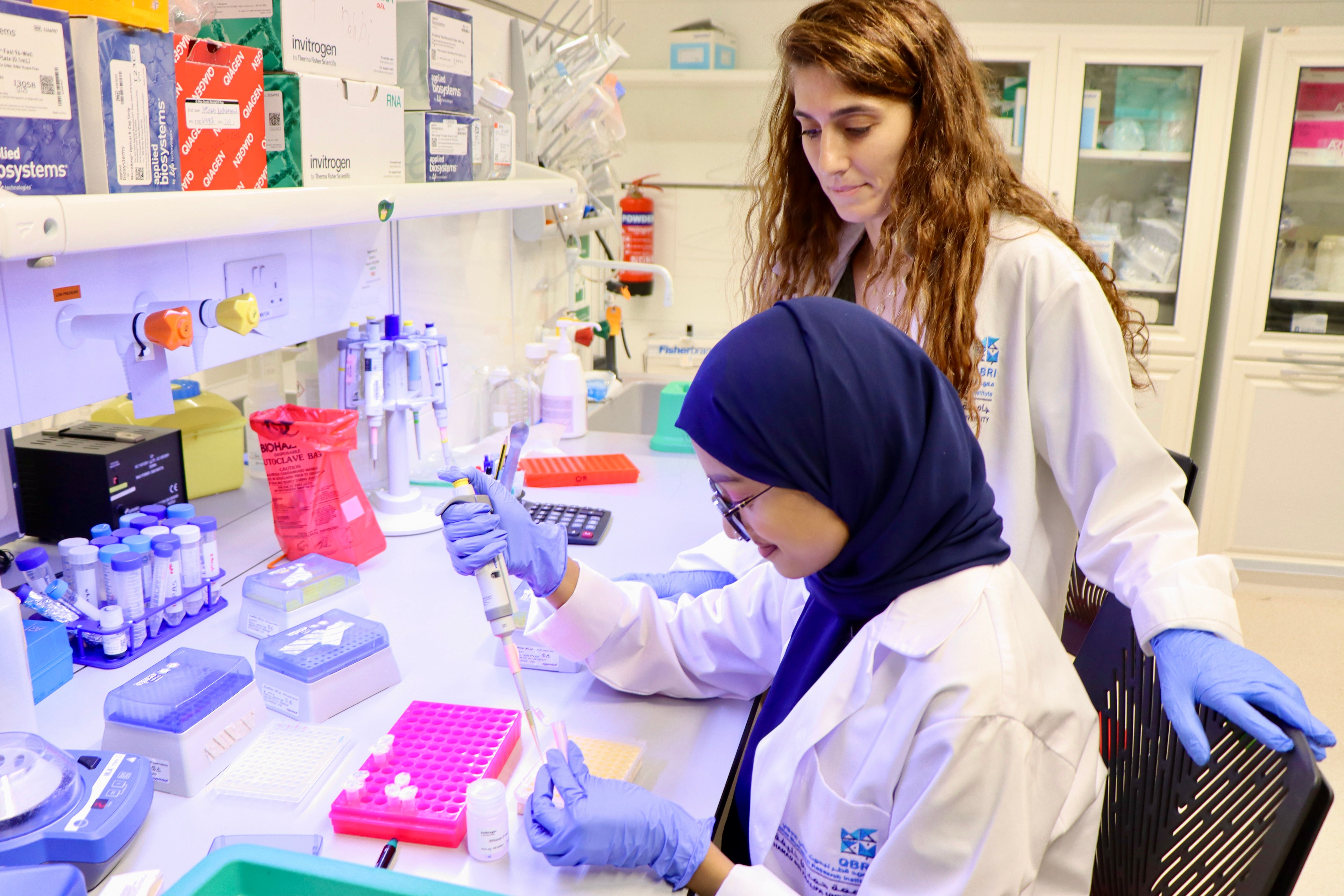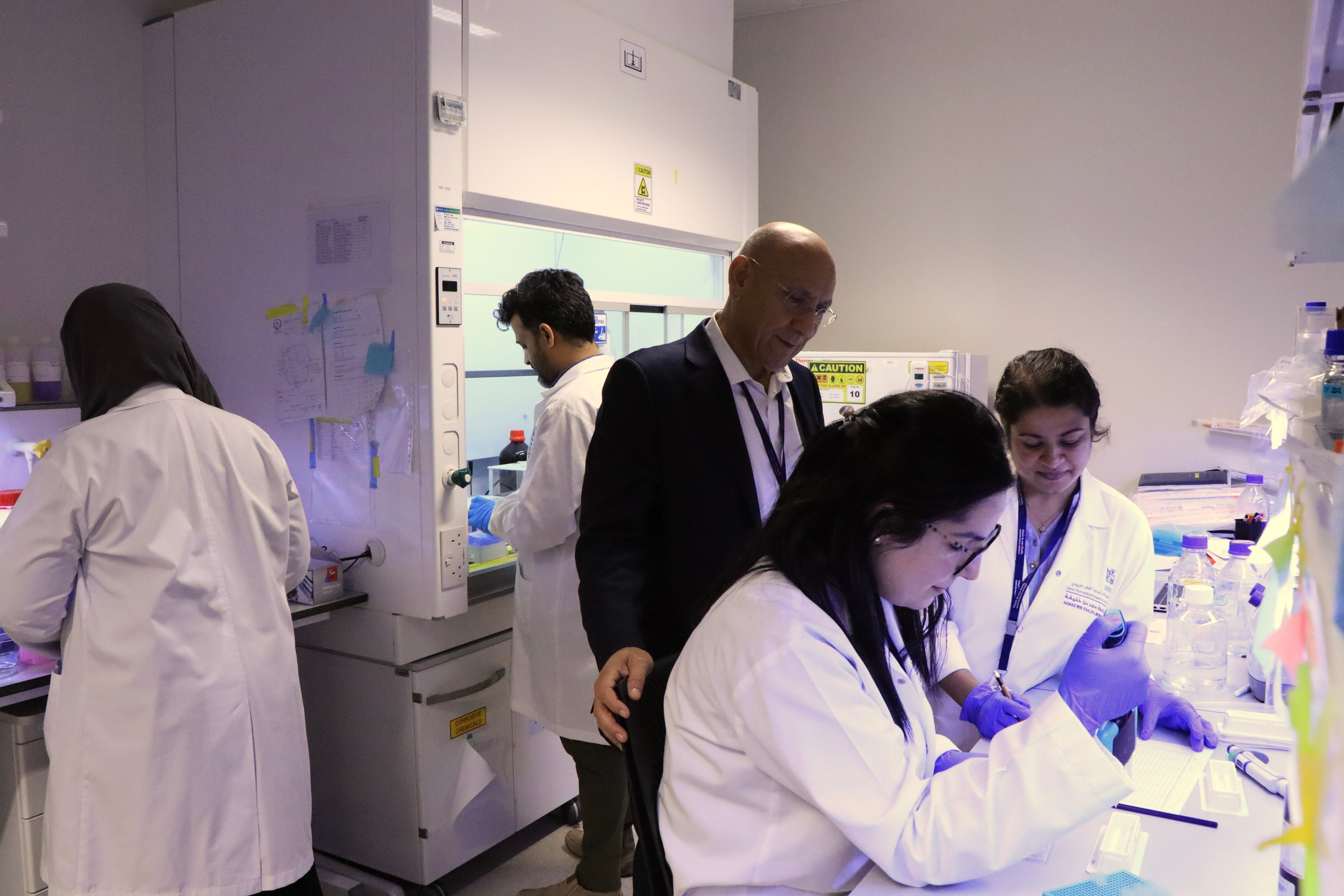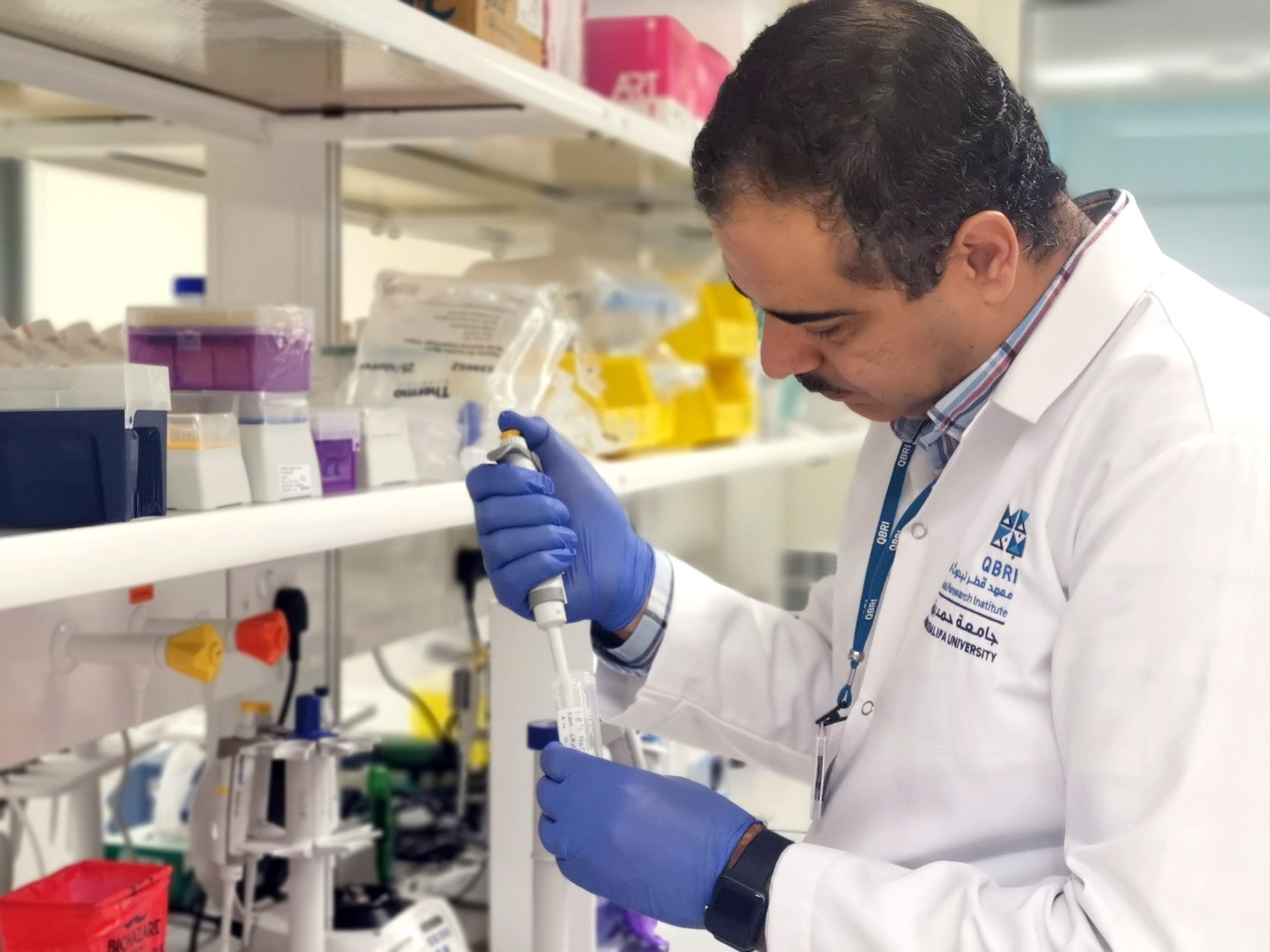
Qatar Biomedical Research Institute at HBKU Hosts Inaugural Neurodegenerative Symposium
International delegates explore novel biomarkers as path towards personalized medicine
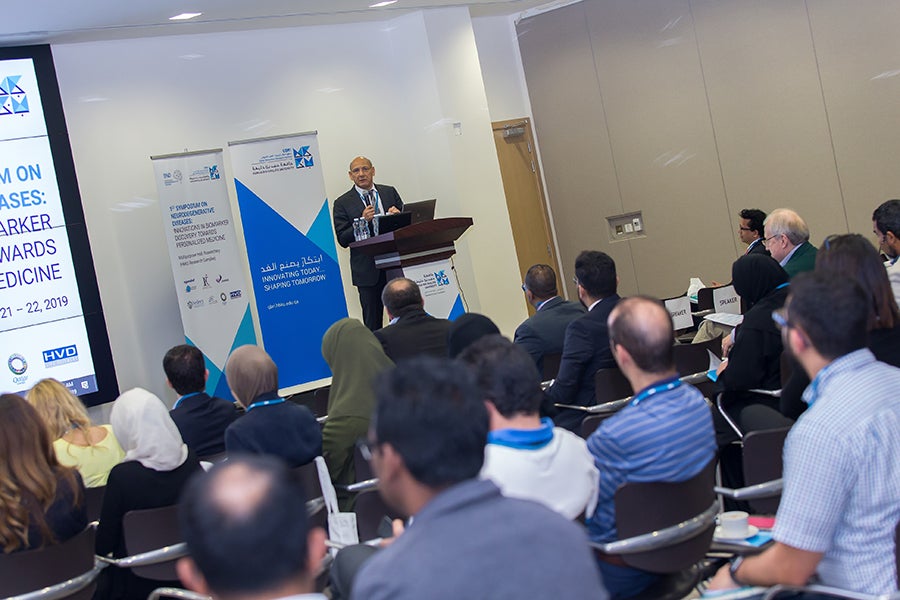
Qatar Biomedical Research Institute (QBRI), part of Hamad Bin Khalifa University (HBKU), recently hosted the First Symposium on Neurodegenerative Diseases: Innovations in Biomarker Discovery Towards Personalized Medicine, which provided a comprehensive overview of the development and discovery of biomarkers to treat neurodegenerative diseases.
The symposium brought together local and international clinicians and researchers from diverse career and educational backgrounds to discuss various topics through a series of panel discussions and presentations. Among the main discussion points of the symposium were developing diagnostic tools for Parkinson’s and Alzheimer’s.
Speaking on the event, Dr. Omar El-Agnaf, executive director of QBRI, said: “We are witnessing an increase in the prevalence of neurodegenerative diseases worldwide. This has served as a catalyst for neuroscientists and researchers to seek out innovative approaches to treating the various disorders that fall under the umbrella of neurodegenerative diseases.
“The inaugural gathering enables delegates to explore how novel biomarkers can be used to advance the treatment of neurodegenerative disease and work towards personalized medicine where patients are treated according to their specific medical needs as individuals. It positions QBRI and Doha at the fulcrum of cutting-edge and inspiring work and ideas – the hallmark of what leading research institutes strive to do.”
Delegates from numerous international institutions, including Hamad Medical Corporation, QBRI, University of Gothenburg, Weill Cornell Medicine-Qatar, Newcastle University, Oxford University, and the University of Rhode Island spoke on a range of key neurodegenerative topics.
Dr. Michael Schlossmacher, Director, Neuroscience Program, Ottawa Hospital Research Institute, said: “As an invited Canadian neuroscientist and guest speaker, the symposium showcased an impressive building, which most of us can only dream of working in with a clever design, generous space and advanced technology platforms. Many talented and young QBRI researchers presented their work demonstrating how much valuable progress has already been made since the institute was founded. I learned a lot from the poster presentations and talks, which informed my understanding of Parkinson's disease-related topics and presented opportunities for new collaborations.”
Dr. Nasser Zawia, professor of pharmacology and toxicology and Ryan Research Professor of Neuroscience and Dean at the University of Rhode Island, Graduate School, said: “QBRI's First Symposium on Neurodegenerative diseases reminded me of the world famous Gordon Research Conferences, where a group of experts from around the world meet to discuss the latest developments in their field. Dr. Omar El-Agnaf and his team ran an excellent meeting full of substance. I enjoyed it tremendously.”
Dr. Kaj Blennow, professor at the Clinical Neurochemistry Lab at the Department of Neuroscience and Physiology at the University of Gothenburg, said: “The symposium consisted of two days with excellent presentations by leading researchers; giving both an overview on what we know about the important age-related brain disorders Parkinson’s and Alzheimer’s disease, and interesting new research findings.”
The inaugural symposium was sponsored by Eppendorf, GulfMed, Qatar Scientific Company, Khalid Scientific Co., Zahrawi, Sedeer, Intertrade Technical Supplies, and HVD Life Science.
QBRI is home to three research centers – Cancer Research Center, Neurological Disorders Research Center (NDRC), and the Diabetes Research Center.
The NDRC focuses on investigating neurological disorders of increasing prevalence in Qatar and the region, including neurodevelopmental diseases such as Autism Spectrum Disorder; Intellectual Disability; and epilepsy, as well as neurodegenerative diseases such as Alzheimer’s and Parkinson’s disease.
QBRI’s mandate is to provide novel solutions for critical health issues facing Qatar and the region. The institute’s research work is at the nexus of theoretical and applied innovations. Since its inception in 2012, QBRI has rapidly cultivated a robust network of local, regional, and international partners and collaborators, all aiming to provide only the very best in healthcare solutions.
For more information on QBRI and its achievements, please visit qbri.hbku.edu.qa.
Related News

100-Year Anniversary of the Discovery of Insulin is of Great Relevance to QBRI
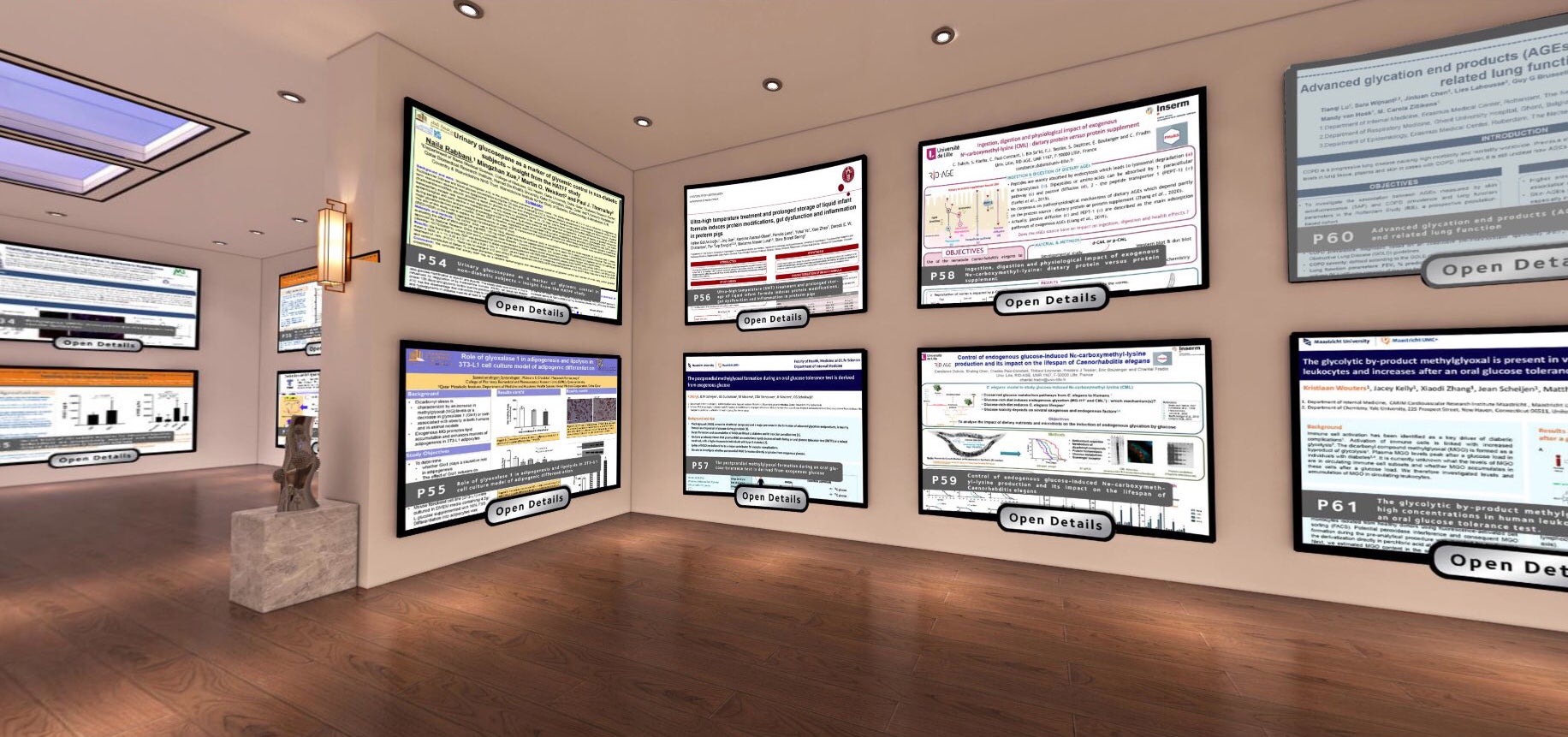
Qatar Biomedical Research Institute and Qatar University Scientists Conclude the International Symposium on Role of Glycation in Food-Health-Disease

QBRI Partners with PHCC and QCRI to Combat Prediabetes Through New Screening Tool

QBRI and Sultan Qaboos University Collaborate on Autism Spectrum Disorder Research

HBKU's QBRI Unveils Promising Arabic Stimuli: A Step Forward in Autism Spectrum Disorder (ASD) Diagnosis

Unveiling New Insights into Dementia: Autoantibodies and Blood-Based Biomarkers

Embracing the Colors of the Autism Spectrum: The Importance of Early Intervention and Advocacy

100-Year Anniversary of the Discovery of Insulin is of Great Relevance to QBRI

Qatar Biomedical Research Institute and Qatar University Scientists Conclude the International Symposium on Role of Glycation in Food-Health-Disease

QBRI Partners with PHCC and QCRI to Combat Prediabetes Through New Screening Tool

QBRI and Sultan Qaboos University Collaborate on Autism Spectrum Disorder Research

HBKU's QBRI Unveils Promising Arabic Stimuli: A Step Forward in Autism Spectrum Disorder (ASD) Diagnosis

Unveiling New Insights into Dementia: Autoantibodies and Blood-Based Biomarkers

Embracing the Colors of the Autism Spectrum: The Importance of Early Intervention and Advocacy

100-Year Anniversary of the Discovery of Insulin is of Great Relevance to QBRI

Qatar Biomedical Research Institute and Qatar University Scientists Conclude the International Symposium on Role of Glycation in Food-Health-Disease

QBRI Partners with PHCC and QCRI to Combat Prediabetes Through New Screening Tool

QBRI and Sultan Qaboos University Collaborate on Autism Spectrum Disorder Research

HBKU's QBRI Unveils Promising Arabic Stimuli: A Step Forward in Autism Spectrum Disorder (ASD) Diagnosis

Unveiling New Insights into Dementia: Autoantibodies and Blood-Based Biomarkers

Embracing the Colors of the Autism Spectrum: The Importance of Early Intervention and Advocacy

100-Year Anniversary of the Discovery of Insulin is of Great Relevance to QBRI

Qatar Biomedical Research Institute and Qatar University Scientists Conclude the International Symposium on Role of Glycation in Food-Health-Disease

QBRI Partners with PHCC and QCRI to Combat Prediabetes Through New Screening Tool

QBRI and Sultan Qaboos University Collaborate on Autism Spectrum Disorder Research

HBKU's QBRI Unveils Promising Arabic Stimuli: A Step Forward in Autism Spectrum Disorder (ASD) Diagnosis

Unveiling New Insights into Dementia: Autoantibodies and Blood-Based Biomarkers

Embracing the Colors of the Autism Spectrum: The Importance of Early Intervention and Advocacy

100-Year Anniversary of the Discovery of Insulin is of Great Relevance to QBRI

Qatar Biomedical Research Institute and Qatar University Scientists Conclude the International Symposium on Role of Glycation in Food-Health-Disease

QBRI Partners with PHCC and QCRI to Combat Prediabetes Through New Screening Tool

QBRI and Sultan Qaboos University Collaborate on Autism Spectrum Disorder Research

HBKU's QBRI Unveils Promising Arabic Stimuli: A Step Forward in Autism Spectrum Disorder (ASD) Diagnosis

Unveiling New Insights into Dementia: Autoantibodies and Blood-Based Biomarkers

Embracing the Colors of the Autism Spectrum: The Importance of Early Intervention and Advocacy

100-Year Anniversary of the Discovery of Insulin is of Great Relevance to QBRI

Qatar Biomedical Research Institute and Qatar University Scientists Conclude the International Symposium on Role of Glycation in Food-Health-Disease

QBRI Partners with PHCC and QCRI to Combat Prediabetes Through New Screening Tool

QBRI and Sultan Qaboos University Collaborate on Autism Spectrum Disorder Research

HBKU's QBRI Unveils Promising Arabic Stimuli: A Step Forward in Autism Spectrum Disorder (ASD) Diagnosis

Unveiling New Insights into Dementia: Autoantibodies and Blood-Based Biomarkers

Embracing the Colors of the Autism Spectrum: The Importance of Early Intervention and Advocacy

100-Year Anniversary of the Discovery of Insulin is of Great Relevance to QBRI

Qatar Biomedical Research Institute and Qatar University Scientists Conclude the International Symposium on Role of Glycation in Food-Health-Disease

QBRI Partners with PHCC and QCRI to Combat Prediabetes Through New Screening Tool

QBRI and Sultan Qaboos University Collaborate on Autism Spectrum Disorder Research

HBKU's QBRI Unveils Promising Arabic Stimuli: A Step Forward in Autism Spectrum Disorder (ASD) Diagnosis

Unveiling New Insights into Dementia: Autoantibodies and Blood-Based Biomarkers

Embracing the Colors of the Autism Spectrum: The Importance of Early Intervention and Advocacy

100-Year Anniversary of the Discovery of Insulin is of Great Relevance to QBRI

Qatar Biomedical Research Institute and Qatar University Scientists Conclude the International Symposium on Role of Glycation in Food-Health-Disease

QBRI Partners with PHCC and QCRI to Combat Prediabetes Through New Screening Tool

QBRI and Sultan Qaboos University Collaborate on Autism Spectrum Disorder Research

HBKU's QBRI Unveils Promising Arabic Stimuli: A Step Forward in Autism Spectrum Disorder (ASD) Diagnosis

Unveiling New Insights into Dementia: Autoantibodies and Blood-Based Biomarkers

Embracing the Colors of the Autism Spectrum: The Importance of Early Intervention and Advocacy

100-Year Anniversary of the Discovery of Insulin is of Great Relevance to QBRI

Qatar Biomedical Research Institute and Qatar University Scientists Conclude the International Symposium on Role of Glycation in Food-Health-Disease

QBRI Partners with PHCC and QCRI to Combat Prediabetes Through New Screening Tool

QBRI and Sultan Qaboos University Collaborate on Autism Spectrum Disorder Research

HBKU's QBRI Unveils Promising Arabic Stimuli: A Step Forward in Autism Spectrum Disorder (ASD) Diagnosis

Unveiling New Insights into Dementia: Autoantibodies and Blood-Based Biomarkers

Embracing the Colors of the Autism Spectrum: The Importance of Early Intervention and Advocacy

100-Year Anniversary of the Discovery of Insulin is of Great Relevance to QBRI

Qatar Biomedical Research Institute and Qatar University Scientists Conclude the International Symposium on Role of Glycation in Food-Health-Disease

QBRI Partners with PHCC and QCRI to Combat Prediabetes Through New Screening Tool

QBRI and Sultan Qaboos University Collaborate on Autism Spectrum Disorder Research

HBKU's QBRI Unveils Promising Arabic Stimuli: A Step Forward in Autism Spectrum Disorder (ASD) Diagnosis

Unveiling New Insights into Dementia: Autoantibodies and Blood-Based Biomarkers

Embracing the Colors of the Autism Spectrum: The Importance of Early Intervention and Advocacy

100-Year Anniversary of the Discovery of Insulin is of Great Relevance to QBRI

Qatar Biomedical Research Institute and Qatar University Scientists Conclude the International Symposium on Role of Glycation in Food-Health-Disease

QBRI Partners with PHCC and QCRI to Combat Prediabetes Through New Screening Tool

QBRI and Sultan Qaboos University Collaborate on Autism Spectrum Disorder Research

HBKU's QBRI Unveils Promising Arabic Stimuli: A Step Forward in Autism Spectrum Disorder (ASD) Diagnosis

Unveiling New Insights into Dementia: Autoantibodies and Blood-Based Biomarkers

Embracing the Colors of the Autism Spectrum: The Importance of Early Intervention and Advocacy

100-Year Anniversary of the Discovery of Insulin is of Great Relevance to QBRI

Qatar Biomedical Research Institute and Qatar University Scientists Conclude the International Symposium on Role of Glycation in Food-Health-Disease

QBRI Partners with PHCC and QCRI to Combat Prediabetes Through New Screening Tool

QBRI and Sultan Qaboos University Collaborate on Autism Spectrum Disorder Research

HBKU's QBRI Unveils Promising Arabic Stimuli: A Step Forward in Autism Spectrum Disorder (ASD) Diagnosis

Unveiling New Insights into Dementia: Autoantibodies and Blood-Based Biomarkers

Embracing the Colors of the Autism Spectrum: The Importance of Early Intervention and Advocacy

100-Year Anniversary of the Discovery of Insulin is of Great Relevance to QBRI

Qatar Biomedical Research Institute and Qatar University Scientists Conclude the International Symposium on Role of Glycation in Food-Health-Disease

QBRI Partners with PHCC and QCRI to Combat Prediabetes Through New Screening Tool

QBRI and Sultan Qaboos University Collaborate on Autism Spectrum Disorder Research

HBKU's QBRI Unveils Promising Arabic Stimuli: A Step Forward in Autism Spectrum Disorder (ASD) Diagnosis

Unveiling New Insights into Dementia: Autoantibodies and Blood-Based Biomarkers

Embracing the Colors of the Autism Spectrum: The Importance of Early Intervention and Advocacy

100-Year Anniversary of the Discovery of Insulin is of Great Relevance to QBRI

Qatar Biomedical Research Institute and Qatar University Scientists Conclude the International Symposium on Role of Glycation in Food-Health-Disease

QBRI Partners with PHCC and QCRI to Combat Prediabetes Through New Screening Tool

QBRI and Sultan Qaboos University Collaborate on Autism Spectrum Disorder Research

HBKU's QBRI Unveils Promising Arabic Stimuli: A Step Forward in Autism Spectrum Disorder (ASD) Diagnosis

Unveiling New Insights into Dementia: Autoantibodies and Blood-Based Biomarkers

Embracing the Colors of the Autism Spectrum: The Importance of Early Intervention and Advocacy

100-Year Anniversary of the Discovery of Insulin is of Great Relevance to QBRI

Qatar Biomedical Research Institute and Qatar University Scientists Conclude the International Symposium on Role of Glycation in Food-Health-Disease

QBRI Partners with PHCC and QCRI to Combat Prediabetes Through New Screening Tool

QBRI and Sultan Qaboos University Collaborate on Autism Spectrum Disorder Research

HBKU's QBRI Unveils Promising Arabic Stimuli: A Step Forward in Autism Spectrum Disorder (ASD) Diagnosis

Unveiling New Insights into Dementia: Autoantibodies and Blood-Based Biomarkers

Embracing the Colors of the Autism Spectrum: The Importance of Early Intervention and Advocacy

100-Year Anniversary of the Discovery of Insulin is of Great Relevance to QBRI

Qatar Biomedical Research Institute and Qatar University Scientists Conclude the International Symposium on Role of Glycation in Food-Health-Disease

QBRI Partners with PHCC and QCRI to Combat Prediabetes Through New Screening Tool

QBRI and Sultan Qaboos University Collaborate on Autism Spectrum Disorder Research

HBKU's QBRI Unveils Promising Arabic Stimuli: A Step Forward in Autism Spectrum Disorder (ASD) Diagnosis

Unveiling New Insights into Dementia: Autoantibodies and Blood-Based Biomarkers

Embracing the Colors of the Autism Spectrum: The Importance of Early Intervention and Advocacy

100-Year Anniversary of the Discovery of Insulin is of Great Relevance to QBRI

Qatar Biomedical Research Institute and Qatar University Scientists Conclude the International Symposium on Role of Glycation in Food-Health-Disease

QBRI Partners with PHCC and QCRI to Combat Prediabetes Through New Screening Tool

QBRI and Sultan Qaboos University Collaborate on Autism Spectrum Disorder Research

HBKU's QBRI Unveils Promising Arabic Stimuli: A Step Forward in Autism Spectrum Disorder (ASD) Diagnosis

Unveiling New Insights into Dementia: Autoantibodies and Blood-Based Biomarkers

Embracing the Colors of the Autism Spectrum: The Importance of Early Intervention and Advocacy

100-Year Anniversary of the Discovery of Insulin is of Great Relevance to QBRI

Qatar Biomedical Research Institute and Qatar University Scientists Conclude the International Symposium on Role of Glycation in Food-Health-Disease

QBRI Partners with PHCC and QCRI to Combat Prediabetes Through New Screening Tool

QBRI and Sultan Qaboos University Collaborate on Autism Spectrum Disorder Research

HBKU's QBRI Unveils Promising Arabic Stimuli: A Step Forward in Autism Spectrum Disorder (ASD) Diagnosis

Unveiling New Insights into Dementia: Autoantibodies and Blood-Based Biomarkers

Embracing the Colors of the Autism Spectrum: The Importance of Early Intervention and Advocacy

100-Year Anniversary of the Discovery of Insulin is of Great Relevance to QBRI

Qatar Biomedical Research Institute and Qatar University Scientists Conclude the International Symposium on Role of Glycation in Food-Health-Disease

QBRI Partners with PHCC and QCRI to Combat Prediabetes Through New Screening Tool

QBRI and Sultan Qaboos University Collaborate on Autism Spectrum Disorder Research

HBKU's QBRI Unveils Promising Arabic Stimuli: A Step Forward in Autism Spectrum Disorder (ASD) Diagnosis

Unveiling New Insights into Dementia: Autoantibodies and Blood-Based Biomarkers

Embracing the Colors of the Autism Spectrum: The Importance of Early Intervention and Advocacy

100-Year Anniversary of the Discovery of Insulin is of Great Relevance to QBRI

Qatar Biomedical Research Institute and Qatar University Scientists Conclude the International Symposium on Role of Glycation in Food-Health-Disease

QBRI Partners with PHCC and QCRI to Combat Prediabetes Through New Screening Tool

QBRI and Sultan Qaboos University Collaborate on Autism Spectrum Disorder Research

HBKU's QBRI Unveils Promising Arabic Stimuli: A Step Forward in Autism Spectrum Disorder (ASD) Diagnosis

Unveiling New Insights into Dementia: Autoantibodies and Blood-Based Biomarkers

Embracing the Colors of the Autism Spectrum: The Importance of Early Intervention and Advocacy

100-Year Anniversary of the Discovery of Insulin is of Great Relevance to QBRI

Qatar Biomedical Research Institute and Qatar University Scientists Conclude the International Symposium on Role of Glycation in Food-Health-Disease

QBRI Partners with PHCC and QCRI to Combat Prediabetes Through New Screening Tool

QBRI and Sultan Qaboos University Collaborate on Autism Spectrum Disorder Research

HBKU's QBRI Unveils Promising Arabic Stimuli: A Step Forward in Autism Spectrum Disorder (ASD) Diagnosis

Unveiling New Insights into Dementia: Autoantibodies and Blood-Based Biomarkers

Embracing the Colors of the Autism Spectrum: The Importance of Early Intervention and Advocacy

100-Year Anniversary of the Discovery of Insulin is of Great Relevance to QBRI

Qatar Biomedical Research Institute and Qatar University Scientists Conclude the International Symposium on Role of Glycation in Food-Health-Disease

QBRI Partners with PHCC and QCRI to Combat Prediabetes Through New Screening Tool

QBRI and Sultan Qaboos University Collaborate on Autism Spectrum Disorder Research

HBKU's QBRI Unveils Promising Arabic Stimuli: A Step Forward in Autism Spectrum Disorder (ASD) Diagnosis

Unveiling New Insights into Dementia: Autoantibodies and Blood-Based Biomarkers

Embracing the Colors of the Autism Spectrum: The Importance of Early Intervention and Advocacy

100-Year Anniversary of the Discovery of Insulin is of Great Relevance to QBRI

Qatar Biomedical Research Institute and Qatar University Scientists Conclude the International Symposium on Role of Glycation in Food-Health-Disease

QBRI Partners with PHCC and QCRI to Combat Prediabetes Through New Screening Tool

QBRI and Sultan Qaboos University Collaborate on Autism Spectrum Disorder Research

HBKU's QBRI Unveils Promising Arabic Stimuli: A Step Forward in Autism Spectrum Disorder (ASD) Diagnosis

Unveiling New Insights into Dementia: Autoantibodies and Blood-Based Biomarkers

Embracing the Colors of the Autism Spectrum: The Importance of Early Intervention and Advocacy

100-Year Anniversary of the Discovery of Insulin is of Great Relevance to QBRI

Qatar Biomedical Research Institute and Qatar University Scientists Conclude the International Symposium on Role of Glycation in Food-Health-Disease

QBRI Partners with PHCC and QCRI to Combat Prediabetes Through New Screening Tool

QBRI and Sultan Qaboos University Collaborate on Autism Spectrum Disorder Research

HBKU's QBRI Unveils Promising Arabic Stimuli: A Step Forward in Autism Spectrum Disorder (ASD) Diagnosis

Unveiling New Insights into Dementia: Autoantibodies and Blood-Based Biomarkers

Embracing the Colors of the Autism Spectrum: The Importance of Early Intervention and Advocacy

100-Year Anniversary of the Discovery of Insulin is of Great Relevance to QBRI

Qatar Biomedical Research Institute and Qatar University Scientists Conclude the International Symposium on Role of Glycation in Food-Health-Disease

QBRI Partners with PHCC and QCRI to Combat Prediabetes Through New Screening Tool

QBRI and Sultan Qaboos University Collaborate on Autism Spectrum Disorder Research

HBKU's QBRI Unveils Promising Arabic Stimuli: A Step Forward in Autism Spectrum Disorder (ASD) Diagnosis

Unveiling New Insights into Dementia: Autoantibodies and Blood-Based Biomarkers

Embracing the Colors of the Autism Spectrum: The Importance of Early Intervention and Advocacy

100-Year Anniversary of the Discovery of Insulin is of Great Relevance to QBRI

Qatar Biomedical Research Institute and Qatar University Scientists Conclude the International Symposium on Role of Glycation in Food-Health-Disease

QBRI Partners with PHCC and QCRI to Combat Prediabetes Through New Screening Tool

QBRI and Sultan Qaboos University Collaborate on Autism Spectrum Disorder Research

HBKU's QBRI Unveils Promising Arabic Stimuli: A Step Forward in Autism Spectrum Disorder (ASD) Diagnosis

Unveiling New Insights into Dementia: Autoantibodies and Blood-Based Biomarkers

Embracing the Colors of the Autism Spectrum: The Importance of Early Intervention and Advocacy

100-Year Anniversary of the Discovery of Insulin is of Great Relevance to QBRI

Qatar Biomedical Research Institute and Qatar University Scientists Conclude the International Symposium on Role of Glycation in Food-Health-Disease

QBRI Partners with PHCC and QCRI to Combat Prediabetes Through New Screening Tool

QBRI and Sultan Qaboos University Collaborate on Autism Spectrum Disorder Research

HBKU's QBRI Unveils Promising Arabic Stimuli: A Step Forward in Autism Spectrum Disorder (ASD) Diagnosis

Unveiling New Insights into Dementia: Autoantibodies and Blood-Based Biomarkers

Embracing the Colors of the Autism Spectrum: The Importance of Early Intervention and Advocacy

100-Year Anniversary of the Discovery of Insulin is of Great Relevance to QBRI

Qatar Biomedical Research Institute and Qatar University Scientists Conclude the International Symposium on Role of Glycation in Food-Health-Disease

QBRI Partners with PHCC and QCRI to Combat Prediabetes Through New Screening Tool

QBRI and Sultan Qaboos University Collaborate on Autism Spectrum Disorder Research

HBKU's QBRI Unveils Promising Arabic Stimuli: A Step Forward in Autism Spectrum Disorder (ASD) Diagnosis

Unveiling New Insights into Dementia: Autoantibodies and Blood-Based Biomarkers

Embracing the Colors of the Autism Spectrum: The Importance of Early Intervention and Advocacy

100-Year Anniversary of the Discovery of Insulin is of Great Relevance to QBRI

Qatar Biomedical Research Institute and Qatar University Scientists Conclude the International Symposium on Role of Glycation in Food-Health-Disease

QBRI Partners with PHCC and QCRI to Combat Prediabetes Through New Screening Tool

QBRI and Sultan Qaboos University Collaborate on Autism Spectrum Disorder Research

HBKU's QBRI Unveils Promising Arabic Stimuli: A Step Forward in Autism Spectrum Disorder (ASD) Diagnosis

Unveiling New Insights into Dementia: Autoantibodies and Blood-Based Biomarkers

Embracing the Colors of the Autism Spectrum: The Importance of Early Intervention and Advocacy

100-Year Anniversary of the Discovery of Insulin is of Great Relevance to QBRI

Qatar Biomedical Research Institute and Qatar University Scientists Conclude the International Symposium on Role of Glycation in Food-Health-Disease

QBRI Partners with PHCC and QCRI to Combat Prediabetes Through New Screening Tool

QBRI and Sultan Qaboos University Collaborate on Autism Spectrum Disorder Research

HBKU's QBRI Unveils Promising Arabic Stimuli: A Step Forward in Autism Spectrum Disorder (ASD) Diagnosis

Unveiling New Insights into Dementia: Autoantibodies and Blood-Based Biomarkers

Embracing the Colors of the Autism Spectrum: The Importance of Early Intervention and Advocacy

100-Year Anniversary of the Discovery of Insulin is of Great Relevance to QBRI

Qatar Biomedical Research Institute and Qatar University Scientists Conclude the International Symposium on Role of Glycation in Food-Health-Disease

QBRI Partners with PHCC and QCRI to Combat Prediabetes Through New Screening Tool

QBRI and Sultan Qaboos University Collaborate on Autism Spectrum Disorder Research

HBKU's QBRI Unveils Promising Arabic Stimuli: A Step Forward in Autism Spectrum Disorder (ASD) Diagnosis

Unveiling New Insights into Dementia: Autoantibodies and Blood-Based Biomarkers

Embracing the Colors of the Autism Spectrum: The Importance of Early Intervention and Advocacy

100-Year Anniversary of the Discovery of Insulin is of Great Relevance to QBRI

Qatar Biomedical Research Institute and Qatar University Scientists Conclude the International Symposium on Role of Glycation in Food-Health-Disease

QBRI Partners with PHCC and QCRI to Combat Prediabetes Through New Screening Tool

QBRI and Sultan Qaboos University Collaborate on Autism Spectrum Disorder Research

HBKU's QBRI Unveils Promising Arabic Stimuli: A Step Forward in Autism Spectrum Disorder (ASD) Diagnosis

Unveiling New Insights into Dementia: Autoantibodies and Blood-Based Biomarkers

Embracing the Colors of the Autism Spectrum: The Importance of Early Intervention and Advocacy

100-Year Anniversary of the Discovery of Insulin is of Great Relevance to QBRI

Qatar Biomedical Research Institute and Qatar University Scientists Conclude the International Symposium on Role of Glycation in Food-Health-Disease

QBRI Partners with PHCC and QCRI to Combat Prediabetes Through New Screening Tool

QBRI and Sultan Qaboos University Collaborate on Autism Spectrum Disorder Research

HBKU's QBRI Unveils Promising Arabic Stimuli: A Step Forward in Autism Spectrum Disorder (ASD) Diagnosis

Unveiling New Insights into Dementia: Autoantibodies and Blood-Based Biomarkers

Embracing the Colors of the Autism Spectrum: The Importance of Early Intervention and Advocacy

100-Year Anniversary of the Discovery of Insulin is of Great Relevance to QBRI

Qatar Biomedical Research Institute and Qatar University Scientists Conclude the International Symposium on Role of Glycation in Food-Health-Disease

QBRI Partners with PHCC and QCRI to Combat Prediabetes Through New Screening Tool

QBRI and Sultan Qaboos University Collaborate on Autism Spectrum Disorder Research

HBKU's QBRI Unveils Promising Arabic Stimuli: A Step Forward in Autism Spectrum Disorder (ASD) Diagnosis

Unveiling New Insights into Dementia: Autoantibodies and Blood-Based Biomarkers

Embracing the Colors of the Autism Spectrum: The Importance of Early Intervention and Advocacy

100-Year Anniversary of the Discovery of Insulin is of Great Relevance to QBRI

Qatar Biomedical Research Institute and Qatar University Scientists Conclude the International Symposium on Role of Glycation in Food-Health-Disease

QBRI Partners with PHCC and QCRI to Combat Prediabetes Through New Screening Tool

QBRI and Sultan Qaboos University Collaborate on Autism Spectrum Disorder Research

HBKU's QBRI Unveils Promising Arabic Stimuli: A Step Forward in Autism Spectrum Disorder (ASD) Diagnosis

Unveiling New Insights into Dementia: Autoantibodies and Blood-Based Biomarkers

Embracing the Colors of the Autism Spectrum: The Importance of Early Intervention and Advocacy

100-Year Anniversary of the Discovery of Insulin is of Great Relevance to QBRI

Qatar Biomedical Research Institute and Qatar University Scientists Conclude the International Symposium on Role of Glycation in Food-Health-Disease

QBRI Partners with PHCC and QCRI to Combat Prediabetes Through New Screening Tool

QBRI and Sultan Qaboos University Collaborate on Autism Spectrum Disorder Research

HBKU's QBRI Unveils Promising Arabic Stimuli: A Step Forward in Autism Spectrum Disorder (ASD) Diagnosis

Unveiling New Insights into Dementia: Autoantibodies and Blood-Based Biomarkers

Embracing the Colors of the Autism Spectrum: The Importance of Early Intervention and Advocacy

100-Year Anniversary of the Discovery of Insulin is of Great Relevance to QBRI

Qatar Biomedical Research Institute and Qatar University Scientists Conclude the International Symposium on Role of Glycation in Food-Health-Disease

QBRI Partners with PHCC and QCRI to Combat Prediabetes Through New Screening Tool

QBRI and Sultan Qaboos University Collaborate on Autism Spectrum Disorder Research

HBKU's QBRI Unveils Promising Arabic Stimuli: A Step Forward in Autism Spectrum Disorder (ASD) Diagnosis

Unveiling New Insights into Dementia: Autoantibodies and Blood-Based Biomarkers

Embracing the Colors of the Autism Spectrum: The Importance of Early Intervention and Advocacy

100-Year Anniversary of the Discovery of Insulin is of Great Relevance to QBRI

Qatar Biomedical Research Institute and Qatar University Scientists Conclude the International Symposium on Role of Glycation in Food-Health-Disease

QBRI Partners with PHCC and QCRI to Combat Prediabetes Through New Screening Tool

QBRI and Sultan Qaboos University Collaborate on Autism Spectrum Disorder Research

HBKU's QBRI Unveils Promising Arabic Stimuli: A Step Forward in Autism Spectrum Disorder (ASD) Diagnosis

Unveiling New Insights into Dementia: Autoantibodies and Blood-Based Biomarkers

Embracing the Colors of the Autism Spectrum: The Importance of Early Intervention and Advocacy

100-Year Anniversary of the Discovery of Insulin is of Great Relevance to QBRI

Qatar Biomedical Research Institute and Qatar University Scientists Conclude the International Symposium on Role of Glycation in Food-Health-Disease

QBRI Partners with PHCC and QCRI to Combat Prediabetes Through New Screening Tool

QBRI and Sultan Qaboos University Collaborate on Autism Spectrum Disorder Research

HBKU's QBRI Unveils Promising Arabic Stimuli: A Step Forward in Autism Spectrum Disorder (ASD) Diagnosis

Unveiling New Insights into Dementia: Autoantibodies and Blood-Based Biomarkers

Embracing the Colors of the Autism Spectrum: The Importance of Early Intervention and Advocacy

100-Year Anniversary of the Discovery of Insulin is of Great Relevance to QBRI

Qatar Biomedical Research Institute and Qatar University Scientists Conclude the International Symposium on Role of Glycation in Food-Health-Disease

QBRI Partners with PHCC and QCRI to Combat Prediabetes Through New Screening Tool

QBRI and Sultan Qaboos University Collaborate on Autism Spectrum Disorder Research

HBKU's QBRI Unveils Promising Arabic Stimuli: A Step Forward in Autism Spectrum Disorder (ASD) Diagnosis

Unveiling New Insights into Dementia: Autoantibodies and Blood-Based Biomarkers

Embracing the Colors of the Autism Spectrum: The Importance of Early Intervention and Advocacy

100-Year Anniversary of the Discovery of Insulin is of Great Relevance to QBRI







